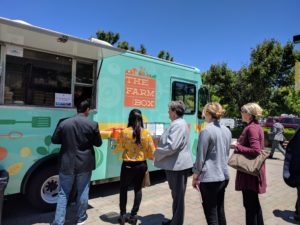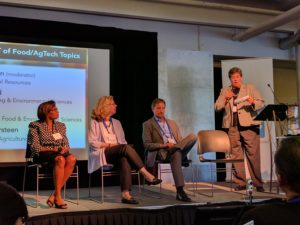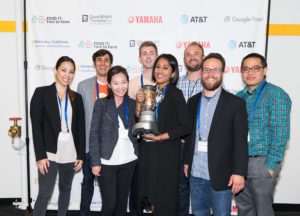Food IT: Fork to Farm
Today’s tech-enabled consumer is the lynchpin of the food system‘ said Rob Trice of The Mixing Bowl in his introduction to Food IT: Fork to Farm. This conference explored the rise in the power of the food consumer and how it impacts farmers, food producers and society. The Mixing Bowl also believes in audience participation to the MAX! First task, chat to your neighbor and then introduce them to the room – a fun way to start the day. - A guest post by Jane Richards. You can read her original post "AgTech at Food IT: Fork to Farm" at Green Eatz here.
Food IT: Google Food

Michiel Bakker from Google Food told us how their food service has evolved from a chef-driven enterprise to a holistic model. Google Food serves 117,000 employees in 56 countries and aims to provide food that increases staff productivity, aligns with the work culture, supports team goals and increases happiness.The campus in Mountain View offers food from 25 food trucks per day – curated by The Whole Cart. We got the chance to try out the fare from The Farm Box and Happy Fish, which offered pasture-raised carbon-neutral beef, wild seaweed salad and fish broth flavored by vegetable scraps. Thanks to The Farm Box for making me a vegan Beet Box.

Food IT: Dean’s List Discussion
It was inspiring to see a panel of female college deans (and one man) share their views on the issues surrounding food and agriculture. They all raised the problem of scientific literacy in America and how consumers are afraid to make choices based on facts. The encouragement of citizen science, and teaching students how to promote science, may address the issue of lack of trust in data, science and big corporations.Dean Helen Dillard believes that agriculture students must spend time on the farm to really understand the issues – I would say, also the slaughterhouse…
Food IT: Changing Food Preferences
The tech-enabled consumer is young and tech-savvy and wants information at their fingertips. They like to know what is in their food, where it is from and if it is good for them. Today’s consumer wants a personal experience and customization and is prepared to invest in products they like and want. The Institute for the Future sees a lot of investment in food innovation, from top-down big investors to crowd-funding from kickstarter.As Michael Wolf of The Spoon said, ‘the kitchen is the only maker space in the home‘ and more people are getting involved in cooking, helped by the myriad of menu delivery services. The future is online shopping but with curated specialty stores that offer a tactile and sensory experience, believed Katie Finnegan from Walmart.
Food IT: Downstream
Yolo are tackling the issue of hunger through connecting farmers directly to foodbanks. Town Kitchen is a food delivery service that employs urban disadvantaged youth. ReFed concentrates on reducing food waste – after all, 15% of energy in the US is used in food production and 40% of that food is wasted. They consider food waste as an asset that can be used for soil regeneration, carbon sequestration and energy production.
Food IT: Upstream
The Food Craft Institute reduces food startup failure through training. Many startups focus on direct-to-consumer sales without testing their product locally first. The farmer-owned co-op Land O’Lakes is investing in sustainability for economic rather than environmental reasons.Rabobank believes we are entering the Third Wave of agriculture – precision farming that uses GPS-linked data to direct operations. We currently have the technology to collect the data but not enough to use it effectively.
Food IT: Golden Blender Competition

n the afternoon, eight startups pitched their innovations in the Golden Blender competition:
Yomee makes pod-based yoghurt-makers with low sugar and natural ingredients
Terva provides an online platform to buy and sell farmland
Hydrogrow grows leafy vegetables in luxury indoor pods
Sugarlogix makes prebiotics based on breast milk!
Your Fare offers a single platform for online restaurant ordering
Nourish is testing automated breakfast cafes run by robots
Impact Vision use hyperspectral imaging to analyze food production quality
REX use data on animal health to identify health risks and needs
Consumer empowerment was the big theme of the day, but the winner of the Mixing Bowl Golden Blender, Impact Vision, bucked the trend with their tech approach to food safety and quality.
Food IT: Deep Dive Breakouts
It was now time for the audience to get down to some work! 15 topics from Marketing to the Internet of Food to Food Waste were on offer for small groups to discuss and dissect. My group tackled Cellular Agriculture and Alternative Proteins – focusing on the tech of lab-grown meat and fish. Our chair, Ron Shigeta invests in early-stage bioscience companies, so had all the latest innovations on hand. The group saw the biggest problem as social acceptance of ‘Franken meats’ and this was particularly relevant to the three vegans. Is it vegan if it is grown from the cells of animals, when no animal was harmed in its creation?
See photos from Fork to Farm here and videos from the event here!

